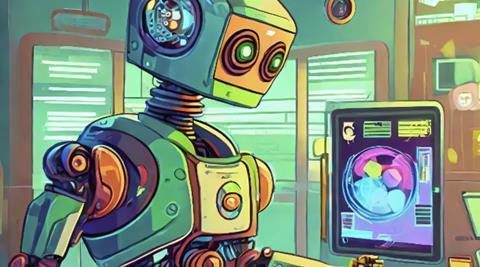Sara El-Hanfy at Innovate UK explains what needs to be done to ease the industry’s fears about genAI and plug the skills gap in AI

Recent advances in generative AI and multimodal technologies have dramatically expanded what’s possible in content creation, and competitive pressures mean that organisations that fail to integrate these tools risk being left behind.
The challenge isn’t simply whether to adopt AI, it’s how to do so while preserving what makes human creativity irreplaceable – and while navigating the complex ethical and practical considerations that come with this transformation.
The creative community’s wariness towards AI reflects legitimate concerns. Research by the Copyright Licensing Agency shows that 79% of creative professionals believe the UK’s ability to earn from creativity will be impacted by AI, with many expressing serious concerns about income reduction due to AI advancements.
The unease also runs deeper than job displacement fears – many illustrators remain uncomfortable with their work potentially being used in AI datasets without consent. This reflects a wider issue of agency and control over how creative work is used and monetised.
These concerns are compounded by a fundamental skills gap. Work in the creative industries as part of the Innovate UK BridgeAI programme has shown that while 92% of arts, entertainment, and recreation businesses reported that ‘AI use’ was not applicable to them, this often reflects a lack of understanding rather than genuine inapplicability.
Despite these concerns, AI has already demonstrated potential in streamlining time-intensive technical tasks. AI-assisted rotoscoping can significantly reduce this process, freeing creators for more fulfilling work. Similarly, AI in colour grading can improve consistency across projects while leaving creative vision firmly in human hands.
In broadcast and media production, AI now handles captioning, subtitling, and metadata tagging. Broadcasters use AI to automatically generate news highlights and create multiple content versions for different platforms. Generative AI tools enable text-to-video generation and automated motion graphics, allowing rapid prototyping of creative concepts.
As demand for high-quality, multi-platform content continues rising while budgets remain constrained, AI’s ability to deliver more content, more quickly, and at lower cost is becoming a business necessity.
However, realising these benefits requires addressing the deficiencies in technical skills among creative sector professionals. These gaps limit their ability to evaluate AI tools critically or make informed decisions about when and how to use them. The challenge is particularly acute for the 94% of creative businesses that are micro-enterprises and often lack the resources for extensive training.
The BridgeAI programme has developed practical resources to address these challenges, including Digital Catapult’s AI Adoption Assessment toolkit for startups, scaleups and SMEs, which helps organisations evaluate their AI readiness, digital maturity, and data ethics.
The Alan Turing Institute’s AI Skills for Business Competency Framework provides a useful roadmap for identifying and developing skills needed to thrive in AI-enabled workplaces. For creative professionals specifically, there are also free AI leadership courses designed to equip the sector with the knowledge and skills to integrate AI into creative processes and strategic decision-making.
On the ethical front, questions about intellectual property, consent, and fair compensation for creative work used in AI training remain largely unresolved. AI development has outpaced both legal frameworks and industry standards for ethical use. Institutions like BSI and the Ada Lovelace Institute are doing important work in these areas.
The conversation about AI in creative industries is ultimately about what kind of creative economy we want to build. The most successful approaches enhance rather than replace human creativity, address concerns about ethics and employment, and provide genuine value to creative professionals rather than simply reducing costs.
The creative industries have always adapted to new technologies, from the printing press to digital editing. But this transformation requires targeted focus where the challenges are most acute. This means developing sector-specific AI tools that address the nuanced requirements of different disciplines. Skills development must go beyond basic AI literacy to encompass new hybrid technical-creative roles.
The sector also needs the development of infrastructure for ethical AI adoption – frameworks for consent in training data use, standards for transparency that creative professionals can actually implement, and legal frameworks that keep pace with technological development.
The creative industries’ future depends on the efforts invested into shaping how it evolves to serve human creativity instead of supplanting it.

Sara El-Hanfy is head of AI and machine learning at Innovate UK








No comments yet